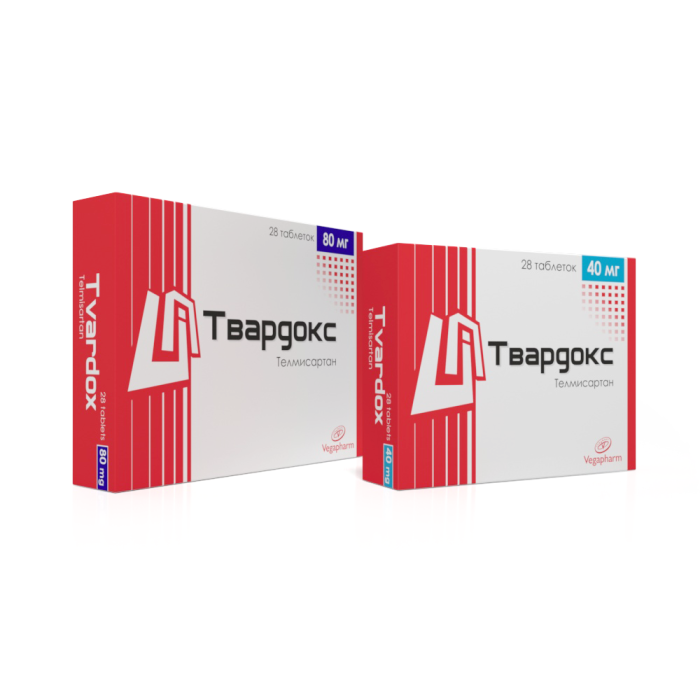
Tvardox
Tablets are oblong, white, embossed with “LC” on one side (for dosages of 40 mg and 80 mg).
One tablet contains:
active substance: telmisartan 40 mg or 80 mg,
excipients: sodium hydroxide, meglumine, povidone (K 25), mannitol (E 421), magnesium stearate, crospovidone.
- treatment of essential arterial hypertension in adults. Prevention of cardiovascular diseases in adults:
- with overt atherothrombotic cardiovascular disease (patients with a history of coronary heart disease, stroke, or peripheral arterial disease)
- with type 2 diabetes mellitus with confirmed target organ damage.
Tablets for oral administration, taken regardless of the meal, once a day with water.
Treatment of hypertension: The usual effective dose of Tvardox is 40 mg once daily. Some patients may experience an effect at a dose of 20 mg. In cases where the desired level of blood pressure is not achieved, the dose of telmisartan can be increased to a maximum of 80 mg once a day. Alternatively, Tvardox can be used in combination with thiazide diuretics, such as hydrochlorothiazide, which, when combined with telmisartan, have a synergistic blood pressure lowering effect. When considering dose escalation, it should be borne in mind that the maximum antihypertensive effect is usually achieved 4-8 weeks after the start of treatment.
Prevention of cardiovascular disease: The recommended dose of Tvardox is 80 mg once a day, it is not known whether doses of telmisartan below 80 mg per day are effective in reducing cardiovascular morbidity. During therapy with Tvardox to reduce cardiovascular morbidity, careful monitoring of blood pressure is recommended. If necessary, it may be necessary to adjust the treatment with other drugs that lower blood pressure.
Patients with impaired renal function: There is limited experience in the treatment of patients with severe renal insufficiency or patients receiving hemodialysis. In such patients, a lower initial dose of 20 mg is recommended. Dose adjustment is not required for patients with mild to moderate renal insufficiency.
Patients with impaired liver function: Tvardox is contraindicated in patients with severe hepatic impairment. In patients with mild to moderate hepatic impairment, the dosage of Tvardox should not exceed 40 mg once daily.
Elderly patients: dose adjustment is not required.
Children and adolescents: Tvardox is not recommended in patients under the age of 18 due to a lack of safety and efficacy data.
Composition
One tablet contains:
active substance: telmisartan 40 mg or 80 mg,
excipients: sodium hydroxide, meglumine, povidone (K 25), mannitol (E 421), magnesium stearate, crospovidone.
Indications for use
- treatment of essential arterial hypertension in adults. Prevention of cardiovascular diseases in adults:
- with overt atherothrombotic cardiovascular disease (patients with a history of coronary heart disease, stroke, or peripheral arterial disease)
- with type 2 diabetes mellitus with confirmed target organ damage.
Mode of application
Tablets for oral administration, taken regardless of the meal, once a day with water.
Treatment of hypertension: The usual effective dose of Tvardox is 40 mg once daily. Some patients may experience an effect at a dose of 20 mg. In cases where the desired level of blood pressure is not achieved, the dose of telmisartan can be increased to a maximum of 80 mg once a day. Alternatively, Tvardox can be used in combination with thiazide diuretics, such as hydrochlorothiazide, which, when combined with telmisartan, have a synergistic blood pressure lowering effect. When considering dose escalation, it should be borne in mind that the maximum antihypertensive effect is usually achieved 4-8 weeks after the start of treatment.
Prevention of cardiovascular disease: The recommended dose of Tvardox is 80 mg once a day, it is not known whether doses of telmisartan below 80 mg per day are effective in reducing cardiovascular morbidity. During therapy with Tvardox to reduce cardiovascular morbidity, careful monitoring of blood pressure is recommended. If necessary, it may be necessary to adjust the treatment with other drugs that lower blood pressure.
Patients with impaired renal function: There is limited experience in the treatment of patients with severe renal insufficiency or patients receiving hemodialysis. In such patients, a lower initial dose of 20 mg is recommended. Dose adjustment is not required for patients with mild to moderate renal insufficiency.
Patients with impaired liver function: Tvardox is contraindicated in patients with severe hepatic impairment. In patients with mild to moderate hepatic impairment, the dosage of Tvardox should not exceed 40 mg once daily.
Elderly patients: dose adjustment is not required.
Children and adolescents: Tvardox is not recommended in patients under the age of 18 due to a lack of safety and efficacy data.